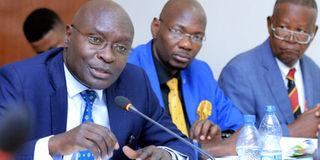One million voters to miss out on polls

Explain. Left to right: The EC chairperson, Justice Simon Byabakama, Deputy Attorney General Jackson Kafuuzi, and Minister of Justice and Constitutional Affairs Ephraim Kamuntu appear before MPs on February 25, 2020. Photo by David Lubowa
What you need to know:
- Last week, the EC started the display of the national voter’s register with 17.7 million voters. The exercise is expected to be concluded on March 10.
An estimated one million voters who turned 18 years in December last year will not be allowed to participate in the 2021 General Election after the Electoral Commission (EC) declined to extend voter registration.
The planned extension pushed by lawmakers targeted first-time voters who were eager to take part in the elections either as voters or candidates after they attained the mandatory age for voting.
The EC decision to block supplementary registration came after MPs on Legal and Parliamentary Affairs Committee chaired by Jacob Oboth-Oboth last week requested EC and the Justice ministry to extend the registration period to allow those who turned 18 years after December cast their vote in next year’s polls.
Justice Simon Byabakama, the EC chairman, however, told MPs that the commissioners had taken the concerns of the MPs but were unable to grant the extension of voter registration except adjusting the nomination periods for presidential candidates and MPs for about two months.
“On the issue of re-opening registration of voters who will turn 18 years between our cutoff date December 23, 2019, up to December 31, 2020, we have given exhaustive consideration to that request,” Justice Byabakama said.
“We have not been able to accede to that request of re-opening registration. On the issue of local government, we have found it very difficult to adjust the nominations for local governments because we have vast numbers and the complexity and magnitude of producing ballot papers of these big numbers,” he added.
The commission, however, agreed to extend nominations for presidential and parliamentary elections to allow candidates prepare for the elections.
“The commission has resolved to adjust the period on nominations for presidential and parliamentary elections from August 12 and 20, respectively to beginning of October,” Mr Byabakama said.
Last week, the ministry promised to reconcile with the commission and report to the committee this week.
The MPs had accused the EC of intentionally disfranchising about one million Ugandans that have reached voting age.
The MPs cited Article 59 of the Constitution which provides that every Ugandan citizen of 18 years of age or above has a right to vote and that it is his or her duty to register as a voter for public elections and referenda.
Justice Byabakama asked his technical staff, Mr Leonard Mulekhwa, EC director of operations, to provide details on why members’ request was rejected.
Mr Mulekhwa said the electoral roadmap was guided by the principle that elections must be held within the timeframes stipulated in Article 61 (2) of the Constitution as amended.
“The current term of office of the President, Parliament and local government councils expire on May 12, 2021. With that in mind, the polling days will be between January 10, 2021 and February 8, 2021, which is the first 30 days of the last 122 days. The Commission has to fix periods for all electoral activities in readiness for the polls taking into account the operational requirements as well,” Mr Mulekhwa said.
He insisted the timelines were fixed after looking at the various electoral activities of the roadmap basing on the number of administrative units that is elective positions, categories of elections, variations for production of ballot papers and declaration of result forms, mode of election, number of polling stations and number of registered voters.
For instance, he said sub-counties, towns and municipal divisions had increased by 47.5 per cent, parishes increased by 34.96 per cent and villages went up by 18.83 per cent.
Mr Mulekhwa also said nominations of local government councils and Parliament to take place, elections for special interest groups (SIGs) committees should have been completed from village to district levels to enable compilation of voters register for nomination of SIGs representatives to local government councils and Parliament.
He said the cleaning and processing of the voters register for nominations of SIGs committees after display of the registers should be completed by March 30.
“The appointment of cut-off of registration of voters and end of general update of the voters register had to be December 23, 2019 to allow for update returns to be captured and processed for production of the display register. Nomination of candidates calls for up-to-date and clean voters register as a cornerstone for free and fair elections,” Mr Mulekwah said.
Last week, the EC started the display of the national voter’s register with 17.7 million voters. The exercise is expected to be concluded on March 10.
Some committee members had reservations on extending nominations for the presidential candidates, saying it will deny other contestants ample time to traverse all the districts during campaigns.
“We should have specified. The extension for nomination should have only looked at MPs not presidential candidates. It will be unfair for other presidential candidates who don’t have choppers to ease their movement across the country,” Bugiri Municipality MP Asuman Basalirwa said.
Nomination dates
•Presidential October 1-2
•Parliamentary October 7-8
•Local Government July 20-28
•Village special interest groups April 6-10



